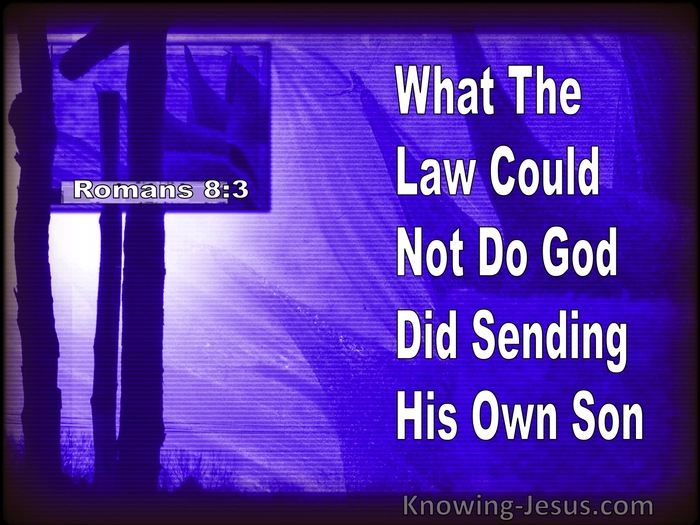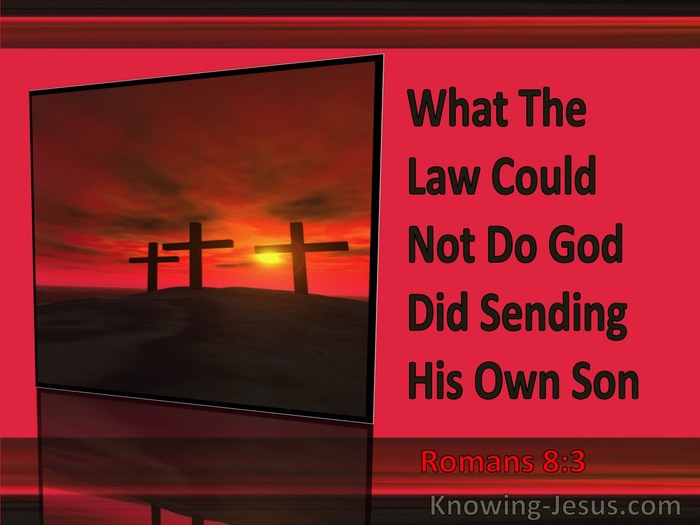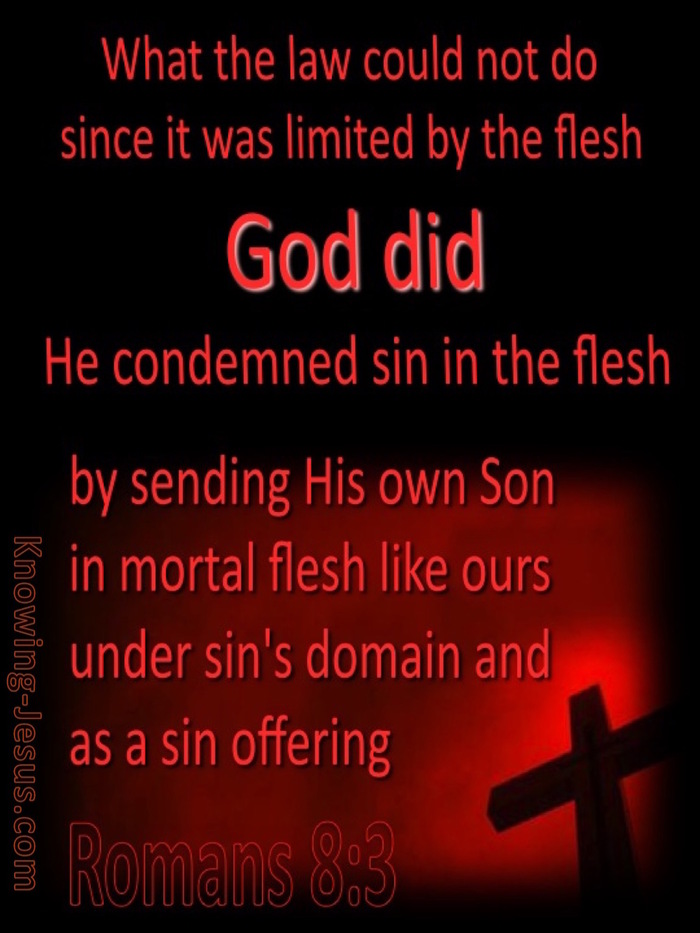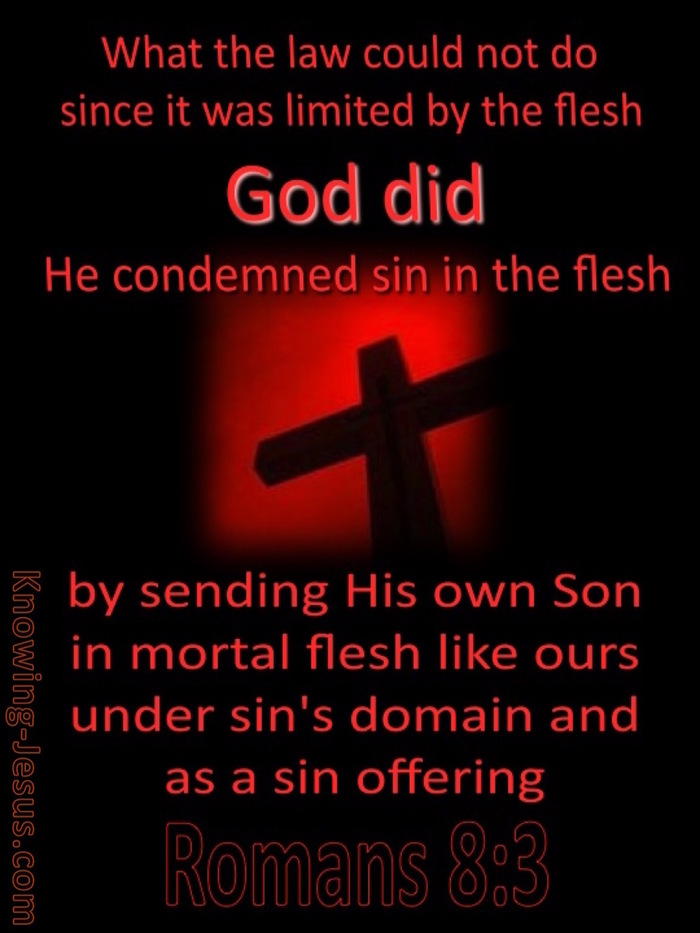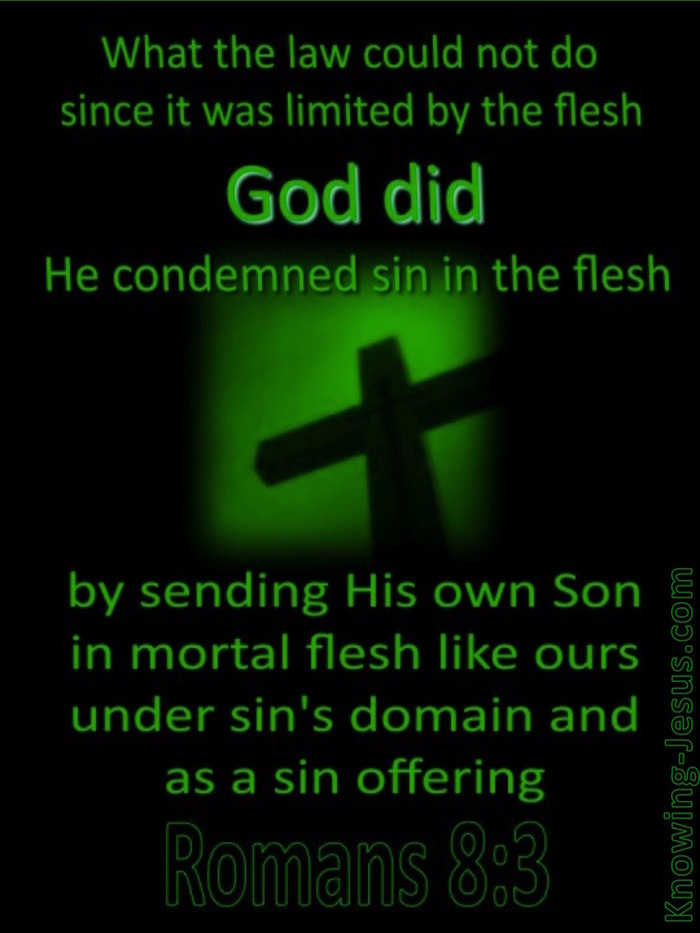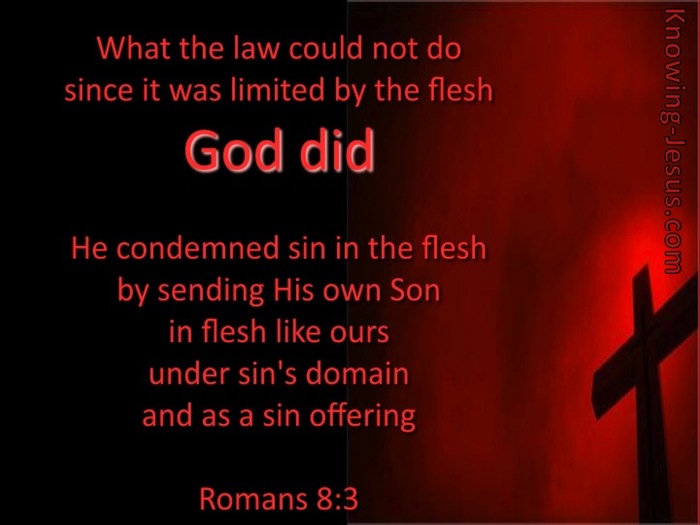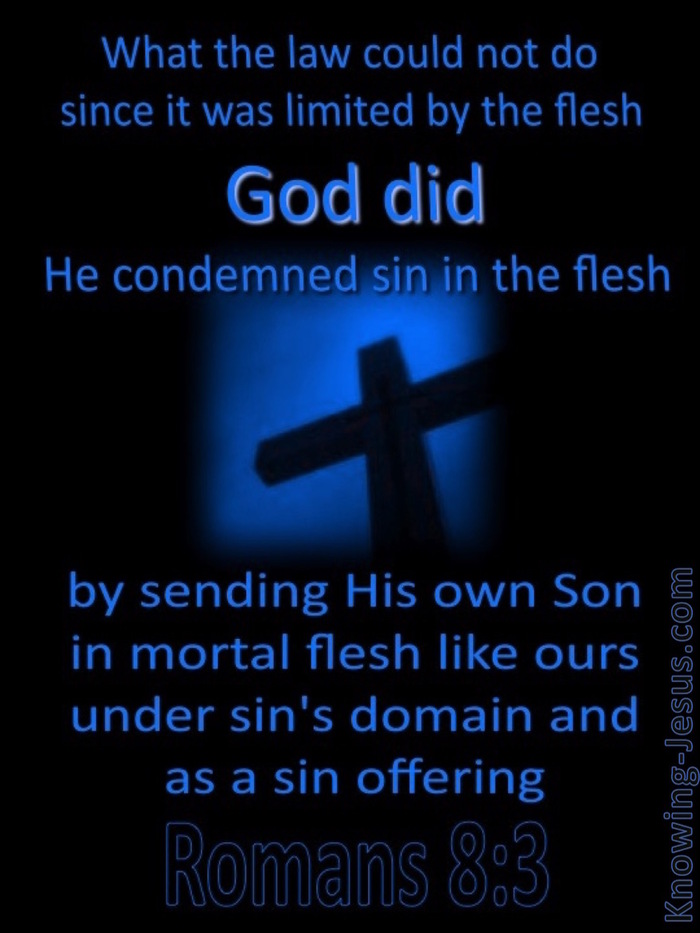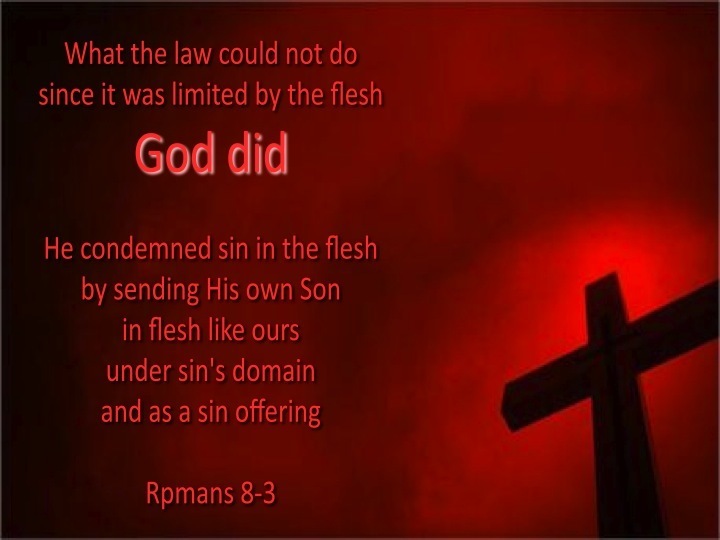Parallel Verses
Daniel Mace New Testament
God having sent his own son invested with a body like that of sinful men, as a sacrifice for sin, thereby destroyed its power; which the law could not effect, human nature being in such a corrupted state.
New American Standard Bible
For
King James Version
For what the law could not do, in that it was weak through the flesh, God sending his own Son in the likeness of sinful flesh, and for sin, condemned sin in the flesh:
Holman Bible
What the law could not do
International Standard Version
For what the Law was powerless to do in that it was weakened by the flesh, God did. By sending his own Son in the form of humanity, he condemned sin by being incarnate,
A Conservative Version
For the impotence of the law, in that it was weak because of the flesh, God, having sent his own Son in a form of flesh of sin, and concerning sin, condemned sin in the flesh,
American Standard Version
For what the law could not do, in that it was weak through the flesh, God, sending his own Son in the likeness of sinful flesh and for sin, condemned sin in the flesh:
Amplified
For what the Law could not do [that is, overcome sin and remove its penalty, its power] being weakened by the flesh [man’s nature without the Holy Spirit], God did: He sent His own Son in the likeness of sinful man as an offering for sin. And He condemned sin in the flesh [subdued it and overcame it in the person of His own Son],
An Understandable Version
For what the law was not able to do [for mankind], since it was [too] weak [to deliver them from condemnation] because fleshly people [were unable to obey it perfectly], God condemned sin in the flesh [i.e., sin was declared evil and its power over man broken]. God did this by sending His own Son in a body like sinful man's, and to destroy sin,
Anderson New Testament
For what the law could not do, because it was weak through the flesh, God has done, who, sending his own son in the likeness of sinful flesh, and for a sin-offering, condemned sin in the flesh,
Bible in Basic English
For what the law was not able to do because it was feeble through the flesh, God, sending his Son in the image of the evil flesh, and as an offering for sin, gave his decision against sin in the flesh:
Common New Testament
For what the law could not do, in that it was weakened through the flesh, God did by sending his own Son in the likeness of sinful flesh, and for sin: he condemned sin in the flesh,
Darby Translation
For what the law could not do, in that it was weak through the flesh, God, having sent his own Son, in likeness of flesh of sin, and for sin, has condemned sin in the flesh,
Godbey New Testament
For there was an impotency of the law, in which it was weak through depravity, God having sent his own Son in the likeness of the sin of depravity and for sin, condemned sin in depravity:
Goodspeed New Testament
For though it was impossible for the Law to do it, hampered as it was by our physical limitations, God, by sending his own Son in our sinful physical form, as a sin-offering, put his condemnation upon sin through his physical nature,
John Wesley New Testament
For what the law could not do, in that it was weak through the flesh, God hath done: sending his own Son in the likeness of sinful flesh, to be a sacrifice for sin, he hath condemned sin in the flesh:
Julia Smith Translation
For the impossibility of the law, in that it was weak by the flesh, God having sent his own Son in the likeness of the flesh of sin, and for sin, condemned sin in the flesh:
King James 2000
For what the law could not do, in that it was weak through the flesh, God sending his own Son in the likeness of sinful flesh, and for sin, condemned sin in the flesh:
Lexham Expanded Bible
For what [was] impossible for the law, in that it was weak through the flesh, God [did]. [By] sending his own Son in the likeness of sinful flesh and concerning sin, he condemned sin in the flesh,
Modern King James verseion
For what the law could not do, in that it was weak through the flesh, God sending his own Son in the likeness of sinful flesh, and for sin, condemned sin in the flesh;
Modern Spelling Tyndale-Coverdale
For what the law could not do, inasmuch as it was weak because of the flesh - that performed God, and sent his son in the similitude of sinful flesh, and by sin damned sin in the flesh;
Moffatt New Testament
For God has done what the Law, weakened here by the flesh, could not do; by sending his own Son in the guise of sinful flesh, to deal with sin, he condemned sin in the flesh,
Montgomery New Testament
For God has done what the Law could not do, weakened as it was by flesh. By sending his own Son in the likeness of sinful flesh, and on account of sin, he condemned sin in the flesh;
NET Bible
For God achieved what the law could not do because it was weakened through the flesh. By sending his own Son in the likeness of sinful flesh and concerning sin, he condemned sin in the flesh,
New Heart English Bible
For what the law could not do, in that it was weak through the flesh, God did, sending his own Son in the likeness of sinful flesh and for sin, he condemned sin in the flesh;
Noyes New Testament
For what the Law could not do, in that it was weak through the flesh, God hath done, who on account of sin sent his own Son in the likeness of sinful flesh, and passed sentence of condemnation on sin in the flesh;
Sawyer New Testament
For what the law could not do because it was weak through the flesh, God having sent his Son in the likeness of sinful flesh, and for sin, condemned the sin in the flesh,
The Emphasized Bible
For, what was impossible by the law in that it was weak through the flesh, God, by sending his own Son in the likeness of sinful flesh and concerning sin, condemned sin in the flesh,
Thomas Haweis New Testament
For that which was impossible by the law, inasmuch as it was impotent through the flesh, God having sent his own Son in the likeness of sinful flesh, and for sin, condemned sin in that flesh:
Twentieth Century New Testament
What Law could not do, in so far as our earthly nature weakened its action, God did, by sending his own Son, with a nature resembling our sinful nature, to atone for sin. He condemned sin in that earthly nature,
Webster
For what the law could not do, in that it was weak through the flesh, God, sending his own Son in the likeness of sinful flesh, and for sin, condemned sin in the flesh:
Weymouth New Testament
For what was impossible to the Law--powerless as it was because it acted through frail humanity--God effected. Sending His own Son in a body like that of sinful human nature and as a sacrifice for sin, He pronounced sentence upon sin in human nature;
Williams New Testament
For though the law could not do it, because it was made helpless through our lower nature, yet God, by sending His own Son in a body similar to that of our lower nature, and as a sacrifice for sin, passed sentence upon sin through His body,
World English Bible
For what the law couldn't do, in that it was weak through the flesh, God did, sending his own Son in the likeness of sinful flesh and for sin, he condemned sin in the flesh;
Worrell New Testament
For, what was impossible under law, wherein it was weak through the flesh. God, sending His Own Son in likeness of sinful flesh, and, respecting sin, condemned sin in the flesh;
Worsley New Testament
For that which was impossible for the law to do, and in which it was weak through the corruption of the flesh, God by sending his own Son in the likeness of sinful flesh to be a sacrifice for sin, hath done; that is, hath condemned sin in the flesh:
Youngs Literal Translation
for what the law was not able to do, in that it was weak through the flesh, God, His own Son having sent in the likeness of sinful flesh, and for sin, did condemn the sin in the flesh,
Themes
The atonement » Has delivered saints from the » Power of sin
Condemnation » Jesus Christ condemning sin
death » What frees you from death
Holy spirit » Those that follow after the spirit
Justification before God » Under the gospel » Is not of works
Law » Christ being the end of the law
Law » Bondage of » Insufficient
Law » Who has fulfilled the law
the Law of moses » Could not give righteousness and life
the Law of moses » Was not the manifestation of the grace of God
Interlinear
En
ἐν
En
ἐν
En
in, by, with, among, at, on, through,
in, by, with, among, at, on, through,
Usage: 2128
Usage: 2128
Astheneo
Dia
heautou
Peri
Hamartia
ἁμαρτία
Hamartia
Usage: 143
Devotionals
Devotionals about Romans 8:3
Devotionals containing Romans 8:3
References
Hastings
Morish
Word Count of 37 Translations in Romans 8:3
Prayers for Romans 8:3
Verse Info
Context Readings
Set Free From The Law Of Sin And Death
2 for the christian dispensation of a spiritual life has set me free from the legal state of sin and death. 3 God having sent his own son invested with a body like that of sinful men, as a sacrifice for sin, thereby destroyed its power; which the law could not effect, human nature being in such a corrupted state. 4 so that the moral obligations of the law might be fulfilled by us, in living according to the spiritual, and not the carnal tenor thereof:
Names
Cross References
Acts 13:39
by him, every one who believes, is purged from all that guilt, for which the law of Moses had made no such provision.
2 Corinthians 5:21
for he hath made him who knew no sin to be a sin-offering for us, that we might be justified by God thro' him.
Hebrews 10:14
for by one single oblation he has purified for ever those that are sanctified.
Philippians 2:7
by assuming the form of a servant: being made in the likeness of men,
Hebrews 10:1-10
For the law being only an allusion to a future dispensation that was more excellent, and not an exact imitation of such a state, cannot by the anniversary sacrifices, which are offered, entirely purify those that present themselves.
Mark 15:27
at the same time they crucified two robbers, one on his right hand, the other on his left.
John 1:14
The Logos became incarnate, and had his tabernacle among us, being full of grace and truth; and we contemplated his glory, such glory as the Monogenes derived from the father.
John 3:14-17
but as Moses lifted up the serpent in the wilderness, even so must the son of man be lifted up:
John 9:24
They therefore again call'd the man that had been blind, and said to him, in the name of God tell the truth: for we know that this man is an impostor.
Romans 3:20
for by the observation of the law no one shall be justified in his sight, since it is the law that takes cognizance of sin.
Romans 6:6
considering this, that our vicious passions were crucified with him, that the body of sin being destroyed, we might not any longer be vassals to sin.
Romans 7:5-11
for when we were in the carnal state of the law, the sinful passions of that state set our animal faculties to work in the service of death.
Romans 8:32
he that spared not his own son, but delivered him up for us all, will he not with him likewise freely give us all things?
Romans 9:3
for I could wish to be as one anathematiz'd from the christian church for my brethren, who are of the same race as my self,
Galatians 3:13
Christ hath redeemed us from the curse of the law, being made a curse for us. (for it is written, " cursed is every one, that hangeth upon a tree.")
Galatians 3:21
Is the law then opposite to the promises? by no means. for if there had been a law given, which could have given life, certainly justification should have been by the law.
Galatians 4:4-5
God sent forth his own son born of a woman, and subject to the law, to redeem those,
Hebrews 2:14
Since then the children were made subject to a state of mortality, so he himself likewise was subject to the same condition: that through death he might destroy him that had the power of death, that is, the devil;
Hebrews 2:17
whence it was necessary he should be in all things like his brethren; that he might be a merciful high priest, and faithfully discharge the divine office of expiating the sins of the people.
Hebrews 4:15
not an high priest who is incapable of compassionating our miseries; since he was exposed to the same trials as we are, sin only excepted. let
Hebrews 7:18-19
wherefore the preceeding law is abolished for its being weak and useless.
Hebrews 10:12
Christ, after he had offered one sacrifice for sin, sat down on the right hand of God for ever:
1 Peter 2:24
he himself cancel'd our sins by the crucifixion of his body, that we being set free from sin, might live in the service of virtue. it is by his bruises that you were healed:
1 Peter 4:1-2
Since then Christ has with respect to his mortal nature died for us, arm yourselves with this reflection, that he, who is dead with respect to sensuality, has renounced sin;
1 John 4:10-14
and what heightens his love, was this, that it was not we who first loved God, but it was he that first loved us, and sent his son to expiate our sins.
